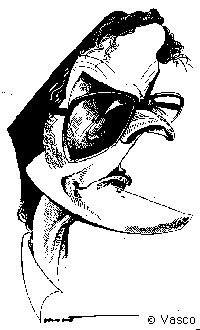|

Alexandre
O'Neill
(1924-1986)
(Vasco Gargalo) |
O'Neill,
Alexandre
[born
Alexandre Manuel Vahia de Castro O'Neill de Bulhões]
(1924-1986), poet, was born on 19 December 1924 in Lisbon, the
only child of the aristocratic banker José António Pereira de
Eça O'Neill de Bulhões (b. 1890) and his wife, Maria da Glória
Vahia de Barros de Castro (1905-1989). The family belonged to a
patrician class, and its members have been in the Portuguese
government, army and church since the Middle Ages. Alexandre
O'Neill's paternal grandmother, Maria da Conceição Infante de
Lacerda Pereira de Eça Custance O'Neill (b. 1873) descended
from Sean [João] O'Neill (b. ca. 1720), born in Kilmore, county
Tyrone, who in 1740 settled in Almada, near Lisbon, being
accepted by the Portuguese court as an exiled Catholic nobleman.
After completing secondary school, Alexandre
O'Neill studied to be a seaman at the Nautical School of Lisbon
but failed due to his marked myopia. Due to family conflicts, in
1946 he went to live with an uncle and started writing poetry.
In 1948 O'Neill was among the founders of the Surrealist
Movement in Lisbon, and contributed poems to Ampola
Miraculosa, a book of surrealist collages. His
relations with the surrealist group ended in 1950 due to
disagreements about aesthetics and style. The following year,
O'Neill's collection Tempo
de fantasmas, was published in Lisbon. Suspected of rebel activities, in 1953 he was arrested by the
state security police and remained in prison for forty days.
O'Neill
earned his living as a writer of advertising copy. He worked for
many agencies, usually as a freelance creative director. Some of
his promotional slogans became famous for their double meanings,
and were repeated by millions of Portuguese people.
Among
them were: Há mar e mar, há
ir e voltar (Instituto de Socorros a Náufragos), Bosch
é Bom (Bosch), No
Colchão Lusoespuma, Você Dá Duas Que Parecem Uma
(Colchões Lusoespuma), and Vá
de Metro Satanás (Metropolitano de Lisboa).
Alexandre O'Neill's poetic works include Tempo
de Fantasmas (1951), No
Reino da Dinamarca (1958), Abandono
Vigiado (1960), Poemas
com Endereço (1962), Feira
Cabisbaixa (1965), De
Ombro na Ombreira (1969), Entre
a Cortina e a Vidraça (1972), A
Saca de Orelhas (1979), As
Horas Já de Números Vestidas (1981), Dezanove
Poemas (1983), and O
Princípio da Utopia (1986).
He
also published two books in prose, As
Andorinhas não Têm Restaurante (1970), and Uma
Coisa em Forma de Assim (1980), as well as selections of
poems by Gomes Leal, Teixeira de Pascoães (with F. Cunha Leão),
Carl Sandburg and João Cabral de Melo Neto. In addition,
O'Neill recorded Alexandre
O'Neill: diz poemas de sua autoria.
After engaging in an intermittent relationship with
the Bulgarian surrealist poet Nora Mitrani in 1949, Alexandre
O'Neill married Noémia Delgado in 1957 and Teresa Patrício
Gouveia in 1971.
Edmundo Murray
References
- Correia,
Arlindo
N.M.
Tomai lá, do O'Neill... (website), available online
(http://www.arlindo-correia.com/o_neill_bio.html), cited
26 June 2007.
- Correia da Silva, Fernando. Vidas Lusófonas (website), available online
(http://www.vidaslusofonas.pt/alexandre_o_neill.htm), cited
26 June 2007.
- Machado, Álvaro Manuel (ed.). Dicionário de Literatura Portuguesa (Lisboa: Editorial Presenta,
1996).
|

